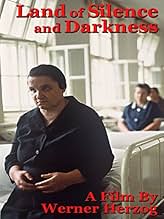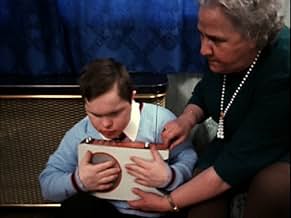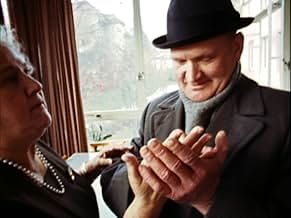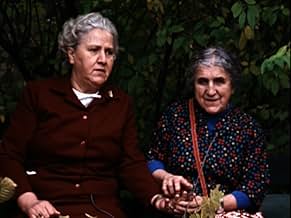Le pays du silence et de l'obscurité
- 1971
- Tous publics
- 1h 25min
Ajouter une intrigue dans votre langueThrough examining Fini Straubinger, an old woman who has been deaf and blind since adolescence, and her work on behalf of other deaf and blind people, this film shows how the deaf and blind ... Tout lireThrough examining Fini Straubinger, an old woman who has been deaf and blind since adolescence, and her work on behalf of other deaf and blind people, this film shows how the deaf and blind struggle to understand and accept a world from which they are almost wholly isolated.Through examining Fini Straubinger, an old woman who has been deaf and blind since adolescence, and her work on behalf of other deaf and blind people, this film shows how the deaf and blind struggle to understand and accept a world from which they are almost wholly isolated.
- Récompenses
- 1 victoire et 1 nomination au total
Avis à la une
While Herzog lays on the orchestral strings over scenes that could be silent themselves, the people speak volumes about how the spirit of humanity and the goodness of human beings can live on in the right circumstances. There's a subtext that Herzog reaches at well of the neglect the people have been served, of some people like the woman who used to use braille but forgot and are put wrongfully in sanitariums, when they could be in the right care functional up to a point in society. So there is that part that is a running theme in most of Herzog's work that's striking, the society at large with the stragglers, those that are just trying to keep up. And out of this he makes at least a few moments, without much interference, into little moments of documentary poetry, like the boy who is ambivalent but finally does go around in the pool and feels ecstatic about being under a shower. Or the simple composition of the young man who can barely eat a banana, but merely the slightest bit of work from Fini gets him reacting.
Wedging on the line between unsentimental and sentimental is a hard thing to do with a group like this, and on a first feature-length documentary Herzog tries and for the most part makes it a brave turn on a subject neglected and bright and moving. It makes sense he would say that this is the one film he's made in decades that he wants to be available most; ironically it is overshadowed by the more astounding (if more crowd-pleasing) work with Grizzly Man and Little Dieter. Even if it isn't a great film, it is a must-see, which is rare in documentary film.
Americans who see this film will be reminded of Helen Keller. But Keller lost her sight and hearing (to scarlet fever) in very early childhood, and retained only very slight memory of her stolen senses. (Touchingly, Keller did recall seeing the rainbows formed by sunlight refracted through the crystal prisms of her mother's chandelier.) Because Straubinger retained a full memory and understanding of vision and sound, she became useful as an ambassador to the kingdoms of the blind and deaf. Fini Straubinger has dedicated her life to working with people who are deaf and blind, most of whom have borne those double handicaps either from birth or (like Keller) from infancy.
Herzog follows Straubinger on a trip through Germany, financed by an organisation for the deaf-blind. We see her communicating with other deaf-blind people through a sort of tapping code. Activities which the rest of us take for granted are truly alien experiences for these unfortunate souls. For instance, the simple act of taking a shower: for someone who has never experienced this before, and cannot have it adequately explained, the sudden onslaught of pressurised water is deeply terrifying. In the final sequence, we see a deaf-blind man hugging a tree: attempting to experience this alien life-form through his senses of touch, taste and smell.
One sequence, showing Straubinger interacting with a chimpanzee, I found unpleasant and unnecessary. I get the impression that this scene was staged by Herzog in an ill-thought attempt to inject some light 'comedy relief' into a subject that audiences might find deeply depressing.
I made a point of identifying this film as a documentary, meaning it's non-fiction. Indeed, Fini Straubinger is a real person: her blindness, her deafness, and (more importantly) her work with the deaf-blind are all real, all true. At one point in this film, Straubinger tells us that her most vivid sensory memory -- before the darkness and silence closed in -- is an image of the rapturous faces of ski jumpers as they leap into the sky. After this film was released, Herzog admitted in an interview that Straubinger had never seen a ski jumper: Herzog wrote those lines for her, because he felt that ski jumpers provided the visual symbol (I refuse to misuse the word 'metaphor') which would simultaneously represent sensory rapture and Straubinger's own isolation.
I reluctantly concede that this sort of fictionalisation is a valid device in documentary films. Those of us who are fortunate to see and hear cannot truly experience the dark silent world of Fini Straubinger and her colleagues. (Unless we too are conscripted into that realm, by accidents or illness.) Since this film can never truly put us into the mind of a deaf-blind person -- especially one who has been both deaf and blind since birth, like most of the people encountered here -- some degree of invention is necessary. I recall an anecdote told by Albert Einstein (too long to repeat here; send me an email if you want the details) concerning his attempt to explain milk to a blind man: this incident never actually occurred, but Einstein told the story to prove a point about his theory of relativity.
'Land of Silence and the Darkness' is a fascinating film about a fascinating human being. My rating: 8 out of 10.
The text on the back cover explains the movie very well:
"Some who live in this land have learned to speak, though they communicate with each other by touch language: what they say comes from the most profound depths of human experience, and is often startingly beautiful and exiting. This is not a depressing movie at all. Neither is it a movie for voyeurs of the grotesque. As Anita Earle writes, 'It is, rather, a testament from another plane of existence'"
At some points in this movie I laughed. The camera often stays very long on lonely, depressing people who spend their days either sitting or lying down. But it wasn't meant to be comedy, it is a way for me to step back. It is a very 'close' picture, it really gets to you. You're thinking "Jesus", and you want to react. And still, it is an artwork.
Le saviez-vous
- ConnexionsFeatured in Je suis ce que sont mes films (1978)
Meilleurs choix
- How long is Land of Silence and Darkness?Alimenté par Alexa
Détails
- Date de sortie
- Pays d’origine
- Langue
- Aussi connu sous le nom de
- Land of Silence and Darkness
- Lieux de tournage
- Sociétés de production
- Voir plus de crédits d'entreprise sur IMDbPro
- Durée1 heure 25 minutes
- Mixage
- Rapport de forme
- 1.37 : 1
Contribuer à cette page

























